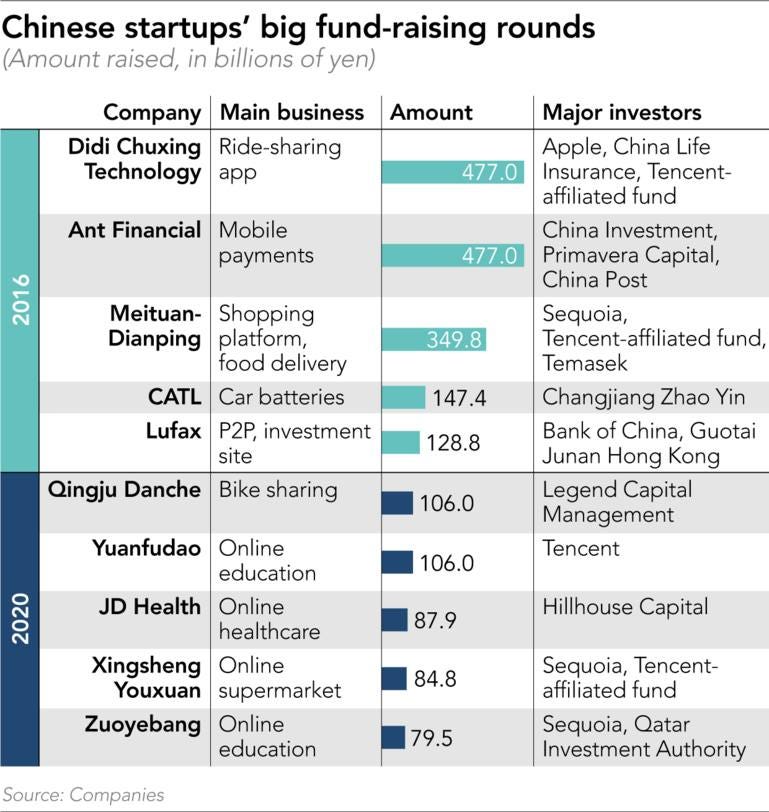As I’m writing this, it’s the beginning of 2021. There were certainly a lot of ups and downs last year to stay the least. Many things changed dramatically around the world.
Many businesses failed, but some startups thrived.
I’m excited to write about many of the impressive startups in China that you need to watch in 2021. These startups not only survived the pandemic but thrived in it, managing to grow incredibly quickly by meeting and exceeding customer needs.
Other Startups to Watch in 2021:
- Top 10 Latin American Startups to Watch in 2021
- Top 10 European Startups to Watch in 2021
- Top 10 African Startups to Watch in 2021
- Top 10 Indian Startups to Watch in 2021
- Top 10 Middle East Startups to Watch in 2021 (Coming Soon!)
- Top 10 Israeli Startups to Watch in 2021 (Coming Soon!)
Want to be the first to know when these posts go live?
Follow me on Medium and subscribe to my newsletter: http://bit.ly/modern-product-manager-newsletter
China’s Startup Environment
During the first 8 months of 2020, startups in China raised ~$33B.
While this amount is very similar to the same period of 2019, the fundraising was far from consistent over the course of the year. In the first 3 months, Chinese startups brought in approximately $7.5B. In the 2nd quarter, funding increased to more than $13.2B. In July and August alone, startups attracted nearly $12.2B.
Similar to how China managed the COVID pandemic, there was a dramatic shutdown/lockdown in Q1, followed by a rapid recovery of the startup funding market.
During 2020, much of this funding found its way to online medical care and remote learning startups, both benefitting heavily from the “new normal.”
Additionally, China saw an increasing number of large deals, including:
- $1.5B by Weltmeister, an electric carmaker
- JD Health ($830MM)
- Electric carmaker Xpeng ($500MM) — which also held a successful IPO on the NYSE during the 3rd quarter
- Grocery delivery company Miss Fresh ($495MM)
- EdTech company Zhangmen.com ($450MM)
- Internet retail company Xiauhongshu ($450MM)
- MedTech company MicroPort Medical Robots ($432MM)
- Discount grocery company Yipin Shengxian ($353MM)

China has grown an incredible number of unicorn companies (208), mainly concentrated in Beijing, Shanghai, Hangzhou, and Shenzen.
China’s unicorns are most heavily focused on Telcom, Logistics, eCommerce, and Finance.
Pre-pandemic (January 2020), Ant Financial and ByteDance (parent company of TikTok) were the most valuable unicorns in China, however Ant Financial’s valuation has certainly taken a hit as a result of their failed IPO.
More on that failed IPO…
Ant Group is owned by Jack Ma, the founder of Alibaba and the company was looking to raise up to $35B in a massive 2020 IPO. However, in early November 2020, Ma and his team were summoned by regulators, who essentially called things off.
Their concerns?
- Chinese Vice Finance Minister Zou Jiayi told a conference that fintech must not be allowed to dodge regulation (Reuters). She added that winner-take-all monopolies are also bad.
- China’s Financial Stability and Development Committee put out a statement about the need to “include all financial activities into the regulatory framework.”
- Chinese bank regulator Guo Wuping similarly wrote that Alibaba’s credit card and loan products are no different from those issued by banks (NYT). They therefore should be regulated the same way, he said.
In short, this aggressive action by China’s central government sent shock waves through the Fintech startup ecosystem in the country. In fact, China’s Fintech sector failed to secure any funding from venture capital firms in 2020.
China is usually ranked among the world’s top hubs for Fintech investment, alongside the US and UK. Instead of investing in China in 2020, Fintech investors are increasingly pursuing “safer bets” by backing late-stage companies in larger rounds outside of China.
Most Fintech deals went to US startups in 2020: Robinhood’s $980MM raise was the largest of the year, followed by pay-later lender Klarna at $650MM and point-of-sale lender Affirm at $500MM.
Sources: Statista, Business-Standard, Nikkei, KPMG, FNLondon, FT
How Did I Choose This Top 10?
2020 dramatically accelerated the adoption curve for grocery delivery, deepened consumer reliance on eCommerce and logistics, and made Chinese consumers much more aware of and concerned about their health.
This year’s Top 10 is heavily concentrated in those industries that experienced strong COVID-19 tailwinds and those I believe won’t go revert when the pandemic goes away.
Some changes simply don’t go back.
The Top 10 Chinese Startups to Watch
- Geek+: Logistics and Robots for Warehouses
Geek+ was founded in 2015 to help warehouse and manufacturing operators manage the growing demands of eCommerce. Today, the company’s logistics systems serve companies like Nike, Dell, DHL and Toyota.
More than 10,000 logistics robots have been deployed by the company for a new generation of automated warehouses.
In February 2020, Geek+ launched its U.S. operations by establishing an office in San Diego. The company now has over 800 employees and is headquartered in Beijing, with offices in Germany, Japan, Hong Kong, Singapore, the U.K., and the U.S.
The company most recently raised a Series C extension round of $50MM in June 2020. With eCommerce exploding around the world in 2020, warehouse robotics like those provided by Geek+ will be essential to managing the increase in demand efficiently.
Offices In: Beijing, China
Total Funding: $439MM
2. Full Truck Alliance/Huochebang: Uber Freight for China
As I mentioned above with Geek+, eCommerce grew dramatically (>30%) in 2020, fueled by pandemic behavioral shifts. In addition to the need for warehouse improvements, transportation was also an industry for startups that saw major growth.
Huochebang is an on-demand logistics platform for commercial trucks across China that matches commercial truckers with shippers that need transportation. Back in 2017, Huochebang merged with Yunmanman to create a platform with more than 4MM trucks, with no plans to slow expansion anytime soon.
The world has changed and Huochebang will continue to grow rapidly as consumers expect more available online, delivered faster, and across more and more of China.
Offices In: Guizhou, Liaoning, China
Total Funding: $327MM
3. Shannon AI: Fintech Focused AI
Founded in 2017, Shannon.ai operates in the financial sector, using AI algorithms to analyze, extract, and integrate financial information.
Translation?
Shannon.ai processes a LOT of data, mostly from source documents like investor reports, filings, and disclosures and makes sense of this information incredibly quickly for their trading customers.
China has proven so far to be a leader in AI startups and I’m excited to see startups like Shannon.ai applying AI to non-identity-verification/location tracking purposes!
Offices In: Beijing, China
Total Funding: $16.8MM
4. Hui’an Jinke (Ahi Fintech): Risk Management via AI
Hui’an Jinke, like Shannon.ai, leverages AI for a different purpose than many Chinese AI unicorns have so far. The company, founded in 2017, leverages AI for risk management and mitigation.
This includes AI/ML enhanced offerings like Anti-Money Laundering (AML), Fraud Monitoring, and Operational Risk Identification.
The company most recently raised a Series A round in 2018 and I wouldn’t be surprised to see them raise their next round of funding in 2021.
Offices In: Beijing, China
Total Funding: $15.3MM
5. Video++: Video Streaming Services + AI Driven Advertising
Founded in 2014, Video++ provides streaming service and advertising tools used by 65% of the top video platforms in China, reaching more than 500MM unique video viewers each month.
In addition to more traditional streaming and advertising offerings, Video++ also offers several differentiated services. For example, the company leverages AI to embed advertisements post production into content. Their product, FaceAI can understand the content of video and place advertisements in proper positions in videos automatically and in real-time.
For example, if FaceAI finds a table in a video, it can place a branded bottle of alcohol on it automatically. When the camera moves and the table’s position changes, the alcohol bottle remains on the table, looking as natural as if it had been in the scene originally.
Video++ most recently raised a Series C round of $105MM in September 2018 and I’m confident they’ll raise a big Series D or explore their public market options in 2021.
Offices In: Shanghai, China
Total Funding: $165MM
6. Meiri Youxian/MissFresh: Instacart for China
Grocery delivery exploded in popularity around the world in 2020! Meiri Youxian/MissFresh has benefited from that growth in a very big way.
The company, founded in 2014, raised not 1, but 2 rounds of funding in 2020! First, they raised a $495MM Series E in July 2020 and then they followed that up with an additional $306MM from investors in December 2020.
Although it’s often compared to Instacart, MissFresh’s business model is actually more similar to Farmstead. The company has ~1,500 smaller distribution centers located closer to residential areas allowing for faster delivery and lower cold chain costs.
Although they already have a valuation well into the billions, there is much room for MissFresh to grow in 2021 and likely pursue an IPO as they expand rapidly into more regions of China.
Offices In: Beijing, China
Total Funding: $1.7B
7. Starfield: Plant-Based Protein (Impossible Foods/Beyond Meat for China)
Founded in 2017, Starfield is a rapidly growing alt-meat brand in China. The company raised a Series A of $10MM mid-pandemic (August-October 2020).
According to the company, Starfield is now the fastest-growing plant-based brand in China. With this new funding, Starfield plans to build a factory in Shenzhen to continue its research and development.
Additionally, the company is hoping to introduce its products to Chinese consumers by partnering with restaurants. It began collaborating with several food service brands in 2019 and has established several new collaborative relationships in 2020, despite the pandemic.
Source: Vegconomist
Offices In: Shenzhen, Guangdong, China
Total Funding: $10.1MM
8. Chehaoduo: Car Trading Platform
Chehaoduo is a used car trading platform that links car sellers and buyers. The company was founded in 2015 and has raised an astonishing $3.6B over the past 5 years, including a $200MM Series D extension in May 2020, adding to the $1.5B Softbank Series D they raised in February 2019.
Similar to the trend in the United States, car ownership has experienced a resurgence in China during the pandemic as people prefer the relative safety of their vehicle compared to public transit or other forms of transportation.
Keep an eye on Chehaoduo in 2021 as they push forward to a likely IPO!
Offices In: Beijing, China
Total Funding: $3.6B
9. Yipin Shengxian/Yipin Fresh: Grocery Chain + WeChat-Based Delivery
Yipin Shengxian aka Yipin Fresh is a grocery store chain that runs nearly 900 fresh-food neighborhood supermarkets in 17 cities in China. It was founded in 2013 in Hefei.
Notably, the company also operates a very popular app and a WeChat mini program called Yipien Daojia, allowing online ordering and second-day delivery. Over the past 3 years, the company has been on a growth and funding tear, which has only been accelerated by the pandemic in 2020:
- Series C: August 2020 ($382MM)
- Series B: March 2019 ($306MM)
- Series A: August 2018 (Not disclosed)
I’m excited to see Yipin Fresh continue to lean into the technology side of their business in 2021 as they scale in China and become a dominant tech-first grocer!
Offices In: Hefei, China
Total Funding: $688MM
10. Intellifusion: Visual Intelligence and AI
Intellifusion, founded in 2014, is an visual intelligence AI company with products based on their computer vision technology for public safety, social governance, new business, AIoT and other fields.
The company closed it’s Series C round of funding in April 2020, mid-pandemic, managing to raise an impressive $153MM in that round alone.
In my past lists, I’ve included CloudWalkandDeepGlint. Intellifusion in poised to follow in the footsteps of those (and many other) AI unicorn companies working heavily with the local, regional, and national Chinese governments.
Offices In: Shenzhen, Guangdong, China
Total Funding: $184MM
Honorable Mentions
Perfect Diary: DTC Beauty Brand
Offices In: Guangzhou, Guangdong, China
Total Funding: $100MM
Ximalaya: Audiobooks, Podcasts, and More
Offices In: Shanghai, China
Total Funding: $123MM
GalaxySpace: Satellite Internet for China
Offices In: Beijing, China
Total Funding: $14.5MM Series A (B + C rounds not disclosed)
What Chinese Startups Did I Miss?
I’m sure I missed quite a few prolific, fast-growing Chinese startups. Let me know which ones on Twitter at @amitch5903!

